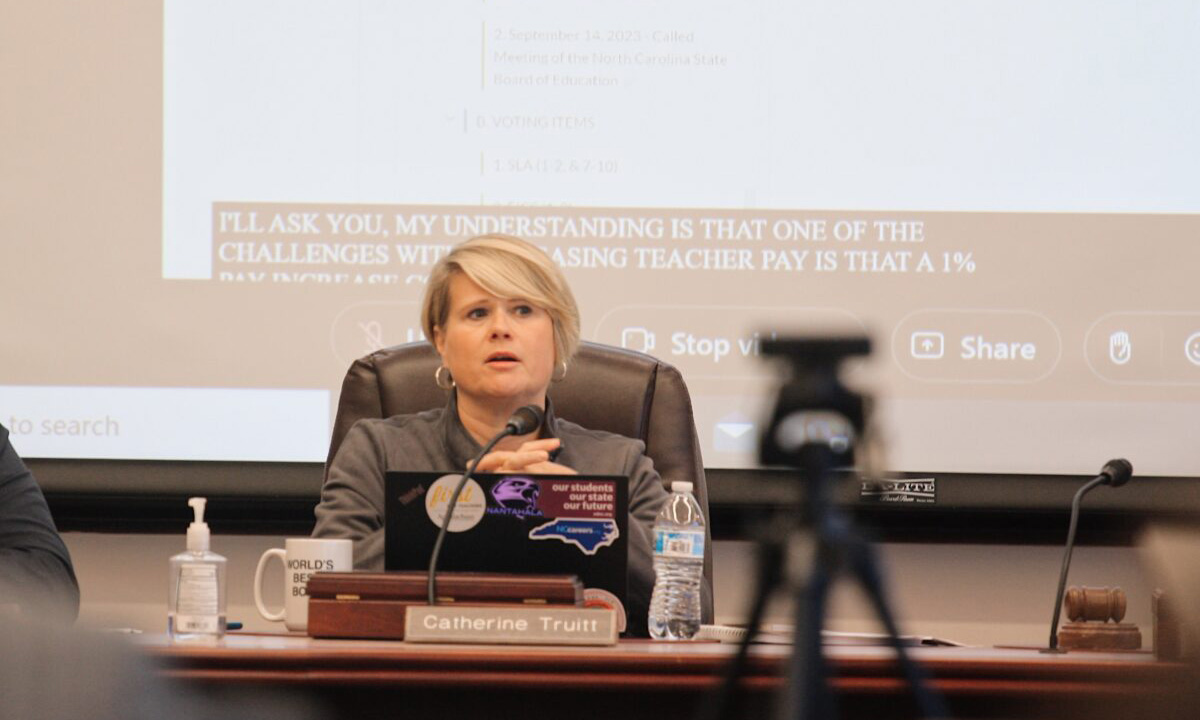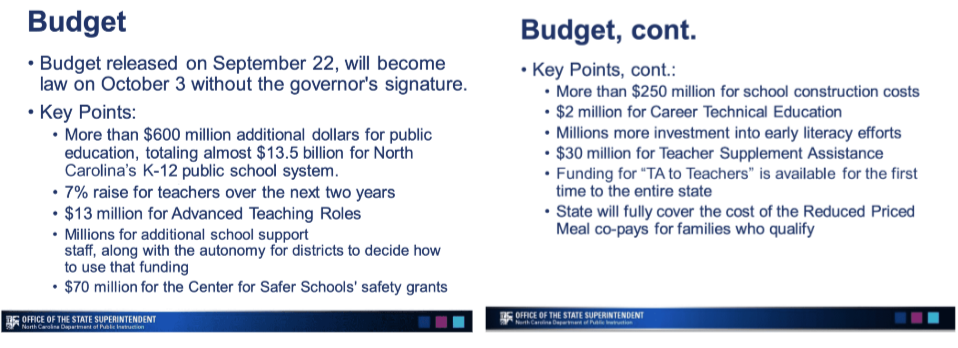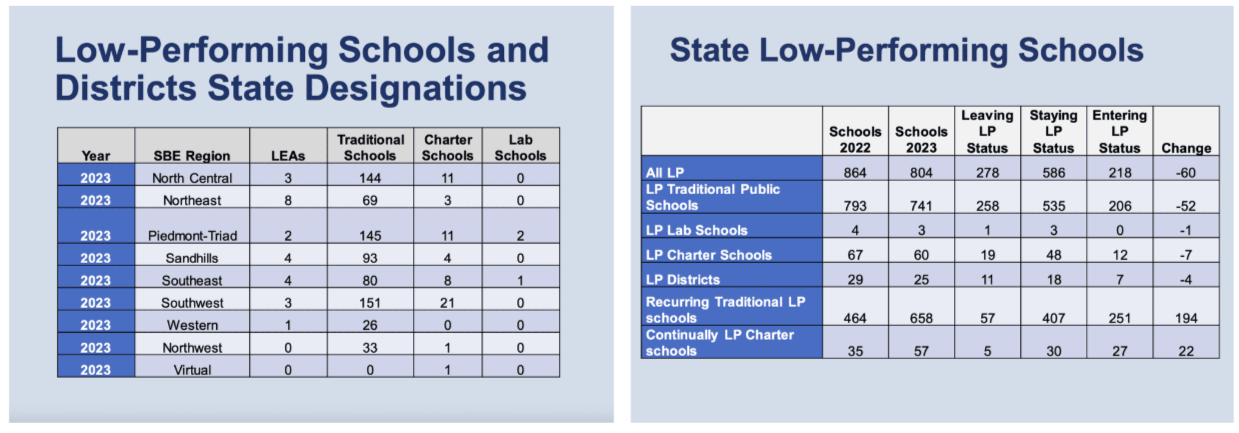A Parents’ Bill of Rights: Inside North Carolina’s New Education Law
The Parents’ Bill of Rights allows parents to review all curriculum and establishes remedies and timelines for parental concerns.

Get stories like this delivered straight to your inbox. Sign up for The 74 Newsletter
The State Board of Education discussed the implications of several items from the new budget at its meeting earlier this month, including Session Law 2023-106, known as the “Parents’ Bill of Rights.”
SL 2023-106 became law on Aug. 16, after the General Assembly overrode Gov. Roy Cooper’s veto of the bill. At the time, state Superintendent Catherine Truitt said school districts needed more time to meet requirements of the new law, asking lawmakers to bump the effective date from Sept. 15 to Jan. 1.
The new budget, passed on Sept. 22, granted that extension for much of the law. The budget also clarified that parents will not need to be notified or provide consent when school personnel act in a medical emergency.
“From the beginning, I’ve supported the Parents’ Bill of Rights law, and I want it to be implemented successfully and enacted fully,” Truitt previously said. “I am very pleased to see that the General Assembly addressed provisions in the conference budget to ensure a smoother process for parents to be fully protected under the Parents’ Bill of Rights.”
The law seeks to “enumerate the rights of parents to direct the upbringing, education, health care, and mental health of their minor children.”
While most Republicans and Democrats agree that the law outlines rights parents already have, Republican bill sponsors said the law safeguards the integral role of parents in their children’s lives. Opponents, including many educators, have said the law will damage the relationship between educators and students, while also threatening the safety of LGBTQ+ students.
The law bans curriculum on gender identity, sexual activity, or sexuality in kindergarten through fourth grade. It also requires schools to notify a parent about their child’s physical and mental health, including any school health care services they use, changes to their well-being, or requests to change a student’s pronouns.
The law also allows parents to review all curriculum and establishes remedies and timelines for parental concerns. Under that provision, the law mandates that school governing bodies adopt procedures for parents to notify principals regarding concerns about curriculum. A process to resolve concerns should take place within seven days of the date of notification by the parent.
After 30 days, “the public school unit shall provide a statement of the reasons for not resolving the concern.” At that point, parents can also request a “parental concerning hearing” with the State Board of Education.
Board leaders had previously spoken out about the provision, saying the hearings “will likely be a frustrating exercise in futility for all involved” and a “significant expenditure of resources.”
On Thursday, the Board discussed a new policy regarding such hearings.
Under the policy, parents can only request a hearing with the Board under limited circumstances. One set of circumstances include the failure of a child’s school to adopt and implement policies to notify parents about the following items:
- Health care services at the child’s school and how parents can provide consent for services.
- The procedures available to parents to remedy concerns.
- A copy of student well-being questionnaires or health screening forms for students in K-3, and how parents can consent to the form.
- Changes in services or monitoring related to “their child’s mental, emotional, or physical health or well-being and the school’s ability to provide a safe and supportive learning environment for that child.”
- Changes in the name or pronoun used for a student “in school records or by school personnel.”
Parents can also also seeks hearings with the Board about the existence of the following procedures or practices at their child’s school:
- Procedures that “do not include a requirement that school personnel either encourage a child to discuss issues related to the child’s well-being with his or her parents or facilitate a discussion of the issues with the child’s parents,” or that encourage a child “to withhold information from that child’s parents about his or her mental, emotional, or physical health or well-being.”
- Procedures that prohibit parents from accessing their children’s school education and health records, except in investigations of abuse.
- Procedures that “result in instruction on gender identity, sexual activity, or sexuality” in K-4.
Notably, that list does not include book challenges, which must be handled at the local level.
Parents can request a hearing about the above items after notifying the principal of their child’s school, if the school has not resolved the concerns within 30 days.
Under the new policy, the Board will appoint a hearing officer for each case who is a member of the North Carolina State Bar and has experience in education and administrative law in the last five years. The public school must pay for the costs of that hearing officer, who would then hold a hearing and submit a recommended decision to the Board within 30 days after their appointment.
“At the next regularly scheduled State Board meeting, held more than seven days after receipt of the recommended decision, the State Board shall vote to either approve, reject, or amend the hearing officer’s recommended decision,” the draft policy says.
You can read the full draft policy.

Graduation requirements
The new budget also requires the State Board of Education to create a three-year graduation track for high school students by Nov. 1. That track will consist of 22 credits, and must receive parental consent.
The budget currently states that “local boards of education shall offer a sequence of courses in accordance” with that minimum requirement. Many schools already allow early graduation pathways for some students, but most schools typically require 28 credits for graduation.
Many education leaders worried the budget’s provision would prevent them from requiring more than 22 credits for any students.
“That of course, caused a lot of outcry from our school districts,” said Sneha Shah-Coltrane, director of advanced learning and gifted education at the Department of Public Instruction (DPI). “As a result, we are very grateful that we are working with the General Assembly on some technical corrections, to be able to move forward with a reasonable, different approach.”
In anticipation of such technical corrections, the Board discussed an amendment regarding early graduations. That policy will come to the Board for approval next month, pending the corrections.
The proposed amendment, “Authority for Local School Boards to Exceed Minimum Graduation Requirements,” outlines a process for students who wish to graduate after three years to “request that local board waive the additional local requirements.”
The student must complete and sign a waiver from the local board. That waiver must also be signed by the student’s parent or legal guardian, unless the student is 18 years or older, or has been emancipated. An administrator from the student’s high school must also then meet with the student and their parent “to discuss the implications of graduating in three years.”
Students who successfully opt to graduate early — and who also seek a degree, diploma, or certificate at an eligible postsecondary institution — will be eligible for “early graduate scholarships” based on financial need. Read more starting on page 194 of the budget.
“This is just another step toward recognizing that the nature of school and work is changing before our very eyes,” Truitt said. “I think it is a very small percentage of students for who it is right to stop at 22 (credits) — this may continue to grow as more and more options become available to students — but what I really like is that this policy requires parent buy-in for this happen.”

Teacher pay
Truitt also spoke about the budget’s raises for school employees — which included a 7% raise over two year for most school employees, and a 3.6-10.8% raise for teachers.
Earlier this long session, Truitt and the Board asked lawmakers for at least a 10% raise for employees.
“As a former educator, I’ve been vocal that North Carolina’s teachers deserve a raise, and I’m disappointed that we did not see the double digit pay increase for educators that we hoped for in this Conference budget,” she said in an email release. “Salaries in other professions have kept pace with inflation, however that is not the case with education.”
Truitt highlighted her disappointment with the raises again during her report on Thursday. Board members also spoke about disappointment in the budget’s provisions for teacher raises.
Board Chair Alan Duncan said he hopes lawmakers will readdress teacher pay in the short session.
“I cannot help but express some disappointment that there was not a better response to the request,” he said. “And I’m sorry for the educators that there was not.”
You can view the updated salary schedules for 2023-24 on DPI’s website. You can also read about the budget’s supplements outlined for educators at this EdNC article.
Truitt said DPI’s requests for the short session will include funding for professional development for middle school teachers, with a focus on improving math proficiency.
Truitt also highlighted the budget’s provision of nearly $13 million into the Advanced Teaching Roles (ATR) initiative — the first directed state funding for the program.
Under that program, adult leadership teachers in participating districts will receive a $10,000 supplement. Classroom excellence teachers will receive a $3,000 supplement.
The Board heard a presentation on the Friday Institute’s evaluation report of the ATR program. The Board opted to send a partial version of the report, due Oct. 15, to the General Assembly, and will submit the full report in November after it is approved with additional information requested by Board members.
Truitt also highlighted the following items from the budget during her report:

Reports on students with disabilities and low-performing schools
The Board heard several important reports on Wednesday regarding student success.
First, the Board discussed a report to the General Assembly regarding students with disabilities.
Per the report, a federal view found several things that “need assistance” within the state’s Exceptional Children (EC) department. The priority areas identified in the report include:
- Participation and performance on statewide assessments
- Suspension and expulsion
- Preschool outcomes
- Child Find/Early Childhood Transition
- Secondary Transition/Post-School Outcomes
The Board also received its annual report from the Council on Educational Services for Exceptional Children, which advises the State Board of Education “on unmet needs of children with special needs and the development and implementation of policies related to the coordination of services for students with disabilities.”
The council made the following recommendations in its 2022-23 report:
- “Hear from the ground.” Invite organizations which provide support to families navigating the education system to speak about best practices and challenges at least once a year.
- Do a survey of other organizations that also serve families with disabilities along with mental health concerns.
- Incorporate “A New Wave of Evidence,” showing that connections between school, family, and community lead to student success.
The Board also discussed its annual report to lawmakers on low-performing districts and schools.
State law defines low-performing schools as those that receive a school performance grade of a D or F and a school growth score of “met expected growth” or “not met expected growth.” A low-performing school district is defined as a district in which the majority of the schools are low-performing.
Here is some data from that report.

On Thursday, the Board also approved two policies related to low-performing schools.
First, the Board approved a policy allowing the Board “to assign an assistance team to any school identified as low-performing or to any other school that requests an assistance team and that the State Board determines would benefit from an assistance team.”
Second, the Board approved a new policy that allows them to appoint an interim district superintendent when more than half the schools in that district are designated as low-performing and the assistance team assigned to a school “recommends the superintendent has failed to cooperate with the assistance team or has otherwise hindered that school’s ability to improve.”
Finally, the Board also saw a preview of its annual report to the General Assembly on Read to Achieve. The Board will vote on that report next month.

Updates to parental leave policy
The State Board of Education gave final approval to its temporary paid parental leave policy, as mandated by Senate Bill 20. That section requires a paid parental leave policy for all state agency, public school, UNC, and community college employees.
Originally, the policy — based on state law — said that employees must have been employed by the public school unit without a break in service “for at least 1,040 hours within the previous 12-month period” to be eligible for paid parental leave.
In other words, employees who moved school districts would not have been eligible for the benefits, even if they had worked in North Carolina public schools for 10 years.
Following pushback, lawmakers made technical corrections to the law. The Board’s new policy will now cover employees who recently switched districts, as long as they have an aggregate 1,040 hours without a break of service at a North Carolina school or state agency.
The policy provides up to eight weeks of paid parental leave after giving birth to a child on or after July 1, 2023, or up to four weeks after any other qualifying event, like adoption or legal guardianship.
The revisions to the rule will be effective on Nov. 7.
Other things to know
- The Board approved a report to the General Assembly on the four-year cohort graduation rate. The goal for 2022–23 was set at 89.5%. The statewide rate, 86.5%, did not meet this year’s target, though 31 individual school districts did.
- The Charter Schools Review Board (CSRB) presented a summary of the 2023 application process in light of new state laws regarding charter schools in the budget. There are currently 15 applications for 2023.
- The Board also approved a new policy, Appeals Process for Charter Schools Review Board. That policy is in response to a new state law that allows “an applicant for a charter school, a charter school, or the State Superintendent of Public Instruction (to) appeal to the State Board of Education from a final decision by the Charter Schools Review Board on whether to grant, renew, revoke, or amend a charter.”
- Thursday marked the last Board meeting for Dr. Maria Pitre-Martin, the director of Board operations and policy.
- The Board offered initial approval two additional community colleges to offer the Elementary Education Residency Licensure Certificate Program: Pitt Community College and Robeson Community College. Those colleges join many other community colleges to receive initial authorization for the program in recent months.
The full State Board of Education meets next Oct. 31 through Nov. 2 at East Carolina University in Greenville for its planning and work session.
This article first appeared on EducationNC and is republished here under a Creative Commons license.
Get stories like these delivered straight to your inbox. Sign up for The 74 Newsletter

;)